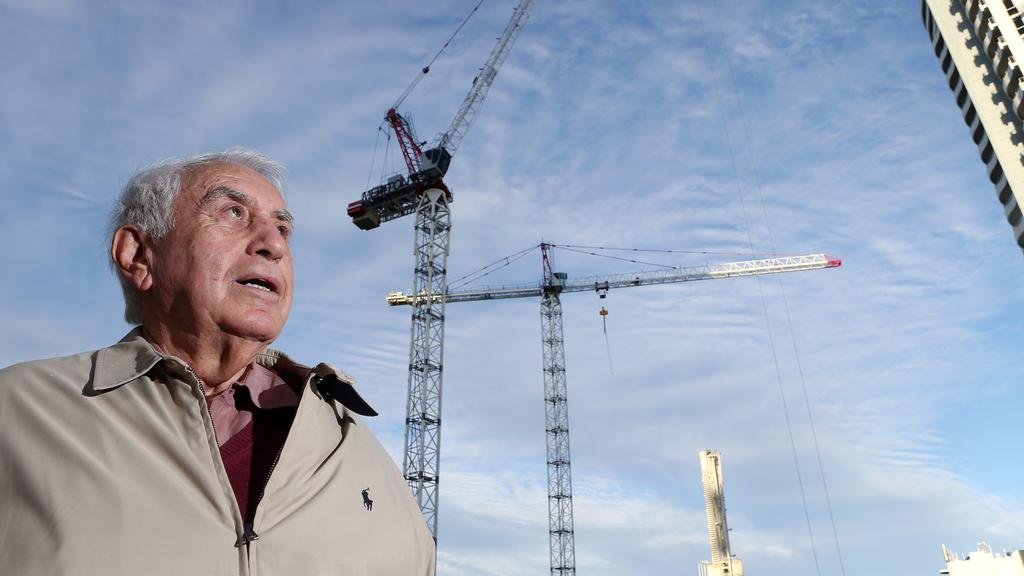Meriton boss Harry Triguboff calls on government to aid rental builders

Billionaire developer Harry Triguboff on the Gold Coast. Picture Glenn Hampson
As Australia’s chronic lack of housing continues apace, the nation’s richest property developer Harry Triguboff has called on federal and state authorities to help developers with build-to-rent residential apartments. Specifically the apartment mogul wants surcharges on foreign buyers – his main market – dropped.
Foreign buyers made up 50 per cent of Meriton’s buyers in 2017-2018, which has now reduced to 5 per cent.
“This was a direct consequence of all of the stamp duty and land tax surcharges imposed and it killed apartment production,” he said.
“The NSW government tripled stamp duty and doubled land tax (without a threshold) on individual foreign buyers yet they will give foreign corporations a 50 per cent discount on land tax.
“If the surcharges are dropped or reduced substantially, foreign buyers will provide immediate pre-sales to increase the rental housing supply and there are ways that you can make them lease to ensure they are made available for local leasing.”

Cranes at a Meriton site in Sydney. Picture: Stephen Cooper
At present Mr Triguboff rents out about 5000 apartments and he also controls about 5000 serviced apartments.
“These numbers will rise considerably in the next 12 months,” he added.
“The government must definitely help people (who are) building to rent. This is because if prices of units go up then big overseas developers will want to sell and not rent.
“If rents are low, no one wants to build to rent.
“If we don’t have enough units to rent, we must help the owners of buildings to rent,” Mr Triguboff said.
“The government must make concessions to investors including the wonderful little investors who are and will always provide rental accommodation. The only foreign investors in reasonable numbers are Chinese.”
He believes not enough housing is being built and that is why he is calling on the government to help.
“Otherwise, people won’t be able to afford to rent,” he maintains.
“Sydney is already losing population to Queensland. Unless we fix renting prices quickly, Sydney will lose even more people.”
He also says there are insufficient rental units because local councils don’t move quickly enough and they do not consider the difficulties of the developers.
The Meriton boss points to the fact that during the 1980s Japanese developers came to Australia, lost money, and moved on. Some 30 years later Chinese developers came “and the majority of them left”.
“There are no major Australian companies that I know that own many apartments for rent,” Mr Triguboff said. “Many local Lebanese builders also did not do as well as they should have even though they provided the most build to rent units over the years.”
Mr Triguboff said he had never had trouble leasing the thousands of units he controlled.
“The only time the rents went down was when we had Covid and our foreign students were told to go and our foreign workers were told to leave.
“But even though rents went down we could always lease them.”

An artist’s impression of Pacific, a twin supertower project proposed for Surfers Paradise on the Gold Coast by Meriton.
Now that students and foreign workers are starting to return Meriton’s rents are increasing.
“When all the students will return and when all the foreign workers will come back the rents will rise more.
“I believe that because finance is so cheap it will be very good for the market and the unit prices will go up in price.”
But there are very few apartments being built now and Mr Triguboff says for Sydney to succeed politicians must appreciate unit providers.
“(Instead) they are scared to be seen with us.”
Mr Triguboff says bureaucrats are also “scared” of unit developers. “This must stop immediately otherwise the people building to rent out will produce little and will often go broke.”
He also called for banks to provide building finance on easier terms, saying less apartments would be built unless this was eased.
Mr Triguboff said he found build-for-rent useful when the residential market was weak, saying he kept some units for when the market rose again.







